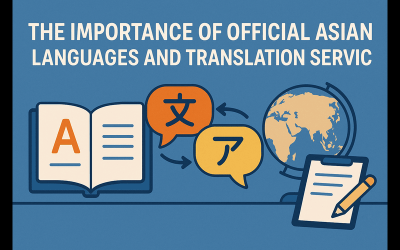Degree translation could never be more imperative in the modern and globalized world. Whether becoming a student extra-territorially, working, or just migrating, your academic credentials must be translated accurately. This post will further discuss the intricacies in the translation of a degree, why it is essential, and how you can ensure that your degree is correctly translated.
What is a Degree Translation?
Degree translation is the process of converting academic credentials from one language into another. This is not just a translation of the words on the document but rather a process to ensure that the translated degree will have the same educational value and context as the degree that was originally issued. In some cases, online certified translation services might be necessary as well.
The following types of documents are usually translated for a degree translation:
Diplomas: This certificate is awarded to any student undertaking a particular course of study.
Transcripts: A transcript is an official, detailed record of academic performance, often including the courses taken, the grades obtained, and the credits earned.
Certificates: These are documents awarded to individuals upon completing a program, course, or even training in any field. In most cases, the registrar usually signs this.
Academic Translation ServicesGet your academic documents translated by an academic translator in 120+ languages with 24 hour delivery. Get a Quote |
Why is Degree Translation Important?
- Academic Pursuits Abroad
The most common need for a degree translation is continuing education in a foreign country. Many colleges and universities require a translation of previously obtained degrees to evaluate whether a student is qualified for admission. An accurate translation will then properly convey your academic success to the institution.
- Job Opportunities
Most multinational companies and organizations require a translated version of your academic credentials as part of their hiring policy. The degree translation is important for getting a job because an employer must ascertain that your qualifications match his specifications.
- Immigration and Visa Applications
Government agencies also require translated academic documents for visa applications, especially on immigration grounds. A certified translation can be required to justify educational background, and that would mean a critical, otherwise significant role it would play in getting the visa approval.
- Professional Licensing and Certification
Some professions, such as medicine, law, and engineering, are regulated through specific certifications and licenses. If you relocate to another country, you must translate your degrees so they can be equated with the local licensing requirements.
Challenges in Degree Translation
Degree translation is nothing like translating an article or even a book. The challenges it poses are numerous, such as:
Educational systems differ from country to country. What is obtained in one country may not be equivalent to what is obtainable in another. The translator must be at par with the source and the target educational systems so that the translation reflects the level and scope of the original degree.
- Specialized Terminology
Such specialized terminology is common in academic documents and may not have direct equivalents in other languages. Translators must be conversant with the terminology applied explicitly in the educational field and the context in which it is used.
- Legal and Certification Requirements
Sometimes, a degree translation must be certified or even notarized to be valid. How the translation is certified differs from country to country and even from one institution to another, and this oversight often causes translated documents to be rejected.
- Cultural Nuances
Cultural differences may further influence the degree of translation. That is, some terminologies or concepts in some cultures have different meanings compared to others. The translator should consider that for accuracy and cultural appropriateness in translation.
Professional Translation ServicesGet your documents translated and certified by a professional translator in 120+ languages with 24 hour delivery. Get a Quote |
How to Ensure Accurate Degree Translation
To ensure the accuracy of your degree translation, consider the following steps:
- Find a Professional Translator
This is a specialized area that requires linguistic competence and some educational background. Therefore, it calls for a professional translator with experience translating academic documents. The client should search for certified or experienced translators to translate academic credentials.
- Look for a Good Translation Agency
If you would like to work with an agency, make sure to choose one with a good reputation and a degree in translation. Most reputable agencies have a team of experienced translators who work together to vet and finalize academic documents.
- Check Certification Requirements
Before submitting your translated documents, verify the requirements of the institution or authority that will receive them. Some institutions or authorities want the translation to be done by a particular organization or authenticated by a legal authority.
- Give Clear Instructions
When submitting your documents for translation, provide clear instructions regarding the purpose of the translation, the language the document is being translated into, and any specific terminology to be used in the process. This will allow the translator to make a more accurate and relevant translation.
- Review the Translation
After translation, recheck your translation for accuracy and completeness of information. If possible, someone who is fluent in both languages should at least look through the translation once.
Common Mistakes to Avoid in Academic Translation
Avoid the following common mistakes to ensure a smooth translation process:
- Avoid Automated Translation Tools
Whereas machine translations like Google Translate can be used to translate basic documents, they are not very appropriate for translating academic documents. These tools often provide inaccurate translations and lack the finesse to use specialized terminologies.
- Failure to Meet Certification Requirements
As indicated above, failure to meet the certification requirement is one common reason your translated document may be rejected. Always check the requirements before embarking on the translation process. When needed, a certified document can be obtained from a certified translation agency.
- Not Accounting for Cultural Differences
Some expressions or words may be interpreted differently due to cultural differences. Inform the translator of this and have it considered when translating.
- Not Heeding Formatting Requirements
This is because, quite often, academic documents are not only about what is written but the format in which the information is presented. The translated document should be in the same format as your original work, seals, signatures, or logos.
Role of Technology in Academic Translation
The contribution and potential of technology in the translation domain have been enormous, but they are very minute when it comes to degree translation. Even though machine translation tools are of immense help in essential translations, these tools cannot translate specialized academic documents. However, there are other ways technology can help manage the translation process, like monitoring the status of your translation or storing your translated documents securely.
Conclusion
One of the most critical processes for any person seeking to study abroad, work, or immigrate is a degree translation. It considers several factors: equivalence of degrees, terminologies specialized in the respective domain, and certification requirements. You can obtain the proper degree translation by engaging a professional translator. Selecting a reputable agency or checking all requirements you must comply with to ensure your translation meets the institution’s or authority’s standard.
Whether it is students, professionals, or immigrants, degree translation is vital in achieving their goals. Remember that it is essential to translate degrees; doing so with an accurate translation will set a milestone for your successful academic or professional journey abroad.
 Rana Maalouf
Rana Maalouf

